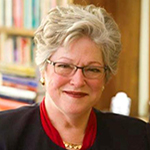By Molly T. Marshall
 I had a very interesting conversation yesterday with a successful cancer doctor who is thinking about taking early retirement and pursuing a degree in religious studies. He reflected on how much pain and suffering he had witnessed over the years and desires, if possible, to make sense of the “order of the universe.”
I had a very interesting conversation yesterday with a successful cancer doctor who is thinking about taking early retirement and pursuing a degree in religious studies. He reflected on how much pain and suffering he had witnessed over the years and desires, if possible, to make sense of the “order of the universe.”
He is not alone in this perplexing quest; theologians and philosophers have written great tomes attempting to resolve the “problem of evil,” and the abstract calculus they produced rarely provides comfort in the midst of life’s exigencies.
The most interesting part of our conversation had to do with his sense that he has no calling, but has simply stumbled through his accomplished life. I confess that this was hard for me to grasp, as I believe that God calls every person into a life that is meant to be purposeful and well-lived. Further, I do not believe vocation is limited to professional clergy or members of a religious order; calling is much more comprehensive than that.
Far too often I have heard persons at church apologize for their professions, saying, “I am a lowly accountant,” “one of those mean attorneys,” “just a teacher” or “a regular business guy,” as if these were inconsequential pursuits. These folks are the very pillars of the church, and without their giftedness honed through their livelihood, the church would not be able to function. We all (well, most of us) need our work to provide a living, but there is a larger intrinsic value gained through participating in the common good.
Our giftedness, talents and aptitudes help shape our calling. We have tended to think of the “gifts of the Spirit” as some sort of add-on that comes after some exhilarating charismatic experience. A more constructive approach, in my judgment, is to see the Spirit as the universal power and energy of life, which God has poured out on the whole world — from the time of creation until the present. The Pentecost experience links the story of Jesus as the Risen Lord to the longer narrative of God at work in the world through the Spirit.
Recently I attended an event at the Yale Club in New York City hosted by the Yale Center for Faith and Culture, which required my very best manners! A member of the advisory committee gave me his ticket so that I might hear a report on the “Life Worth Living” project, an effort to revive critical discussion in universities and the broader culture about the most important question of our lives: “What is a life worth living?”
Answering this question has become the focus of an interdisciplinary course at Yale. Through exploration of religious traditions, key philosophers and the university’s own archive of mission statements and commencement addresses, students have been putting their intellectual capital to discern what constitutes this sort of well-lived life. I was impressed with the impact this was having on students, and many of them ventured into theistic conversations as a result of the class. One reportedly asked, “Is it OK to talk about God in this course?”
“Limit situations,” a description coined by Karl Jaspers, describes those human situations of guilt, suffering, despair, conflict and grief that seem intractable. They serve as teacher of humankind and raise the question of what or who might transcend these limits. They beckon persons to consider significance and purpose amidst human frailty, as well as hope and possible horizons. I believe they are prompts from God about the meaning of our lives.
The students I engaged at this gathering were considering how to make their lives a gift on the social landscape. From my perspective, they were interpreting their lives as a precious trust, and thus the claim of distinct employment pursuits bore the quality of a calling. Of course, my theological ears may be given to selective perception, hearing what I want to hear, but the depth of their discernment surely carried vocational overtones.
Tom Wright speaks about “echoes of a voice” in his little primer, Simply Christian. He suggests that humans reverberate with a sense of being addressed, and that our response makes all the difference. That we are capable of responding is a distinguishing mark of being made after God’s likeness.
Is the restlessness my cancer doctor friend is experiencing a calling? His longing to find truthful ways to describe the heavy burdens he has accrued over the years suggests a fresh beckoning to me. One of the challenges of our lives is give an interpretive framework of meaning to the many narratives that construe our being. A generous view of calling, the idea that God has interest in our individual lives for the sake of a larger good, can assist us in charting well-lived lives. Our world surely needs more of those!
